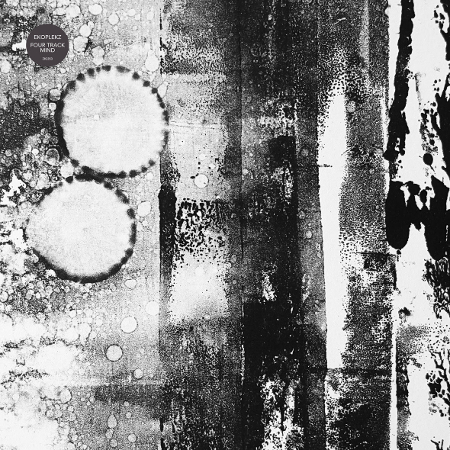What a year it has been for Ekoplekz’s Nick Edwards. March saw the release of his most fully-realised album to date, Unfidelity, on which his surreal blend of motoric techno and ectoplasmic DIY hauntology reached its most direct, sinewy peak. To my mind, Edwards has surpassed all other similar artists in the way he has drawn a line between quasi-dancefloor friendly melodic electronica and an austere form of post-industrial kosmische rooted in English eccentricity, folklore and arcana. His move to Planet Mu for Unfidelity crystallised his various inspirations ("influences" is somehow inappropriate) into something more focused than before, and he’s elevated the vision on that album even higher with Four Track Mind.
Most of the tracks on Four Track Mind were recorded around the same time as those on Unfidelity, but the mood is notably different. For all its inherent queasiness and nods to the austere industrial electronica of Robert Rental, Unfidelity was an almost bright and upbeat album, the murk of previous releases replaced with driving techno beats and Harmonia-esque synth layers. On Four Track Mind, Edwards lingers over his tracks, with four of them stretching past the eight minute mark. An atmosphere of sombre contemplation looms over the album like a pall of smoke, an introspective yang to Unfidelity‘s sardonic energy. If the album’s title suggests a collection of lo-fi afterthoughts tacked on to its predecessors coat-tails, nothing could be further from the truth. This is a fully fleshed-out work that evolves almost like a concept album, and it’s a journey that takes the listener into the murkier recesses of Nick Edwards’ psyche.
‘Return To The Annex’ is the track that best epitomises the central motif on Four Track Mind. Over languid, swirling synths, Edwards deploys a series of stark clatters and an eerie recording of himself as a child talking to his long-deceased father. There’s a lot of talk about how acts like Ekoplekz (Demdike Stare, Broadcast, the Ghost Box lot) play with themes of memory, but it’s for any of them to delve into such personal material. The track is evocative and unsettling, with Edwards expertly overlapping loops and and percussion, delicately creating a miniature suite that lingers long after its ten minutes have expired. ‘Ariel Grey’ is similarly ethereal, an intricate collage of looped vocal echoes, throbbing electronic lines and aquatic effects, whilst ‘Tantrikz’ edges along on an hypnotic krautrock-ish backbeat, perhaps the clearest nod towards influences like Harmonia and Cluster that Edwards allows himself on the album. Even the shorter, faster-paced tracks on Four Track Mind contain trace elements of taut emotions, such as the driving mutant techno of ‘Reflekzive’, which is propelled by twitching beats and a sweeping phantom choir, or the bouncy, echo-laden ‘Interstice’. Edwards’ liberal use of reverb and echo means each track, no matter how short, seems to stretch time, with the likes of ‘Reflekzive’ and ‘Dvectif’ sounding like horror movies soundtracks compressed into bite-sized form. Four Track Mind is, for all the occasional moments of snide levity and gallows humour, a grim and haunting listen.
A rather lazy shorthand has grown up when it comes to discussing a lot of this new British electronica (or hauntology, if you prefer), with consistent references to seventies TV shows like Doctor Who or The Owl Service and public information videos. Sure, Nick Edwards’ analogue synths have a few sounds you might hear on vintage sci-fi TV, but, on listening to Four Track Mind a rather different visual artefact from the seventies crept into my mind: Ian Merrick and Michael Armstrong’s horrifying 1977 low-budget thriller The Black Panther. The film tells the true story of serial killer Donald Neilson, who killed three village postmasters and kidnapped heiress Lesley Whittle in 1975. I don’t know if Edwards ever saw the film (an outraged press, probably trying to make up for their own role in the botched rescue attempt of Whittle which may have led to her death, accused the directors of exploitation and The Black Panther was effectively buried for decades), but the oppressive, austere nature of the music on Four Track Mind seems to hark back to that not-so-lost England of grim suburbia, crumbling industrial landscapes and sordid violence.
It’s hard not to regret that Four Track Mind won’t see a wider release than the few hundred vinyl copies Planet Mu are going to put out, but I can see why Unfidelity was given precedent: it’s the more open, "accessible" (not quite the right term when dealing with Ekoplekz) and concise work. But Four Track Mind is more than its predecessor’s morose cousin: it’s a triumphant work in its own right, more intimate and intense, and confirms Nick Edwards as one of the most exciting artists of the year.
<div class="fb-comments" data-href="http://thequietus.com/articles/16208-ekoplekz-four-track-mind-review” data-width="550">


